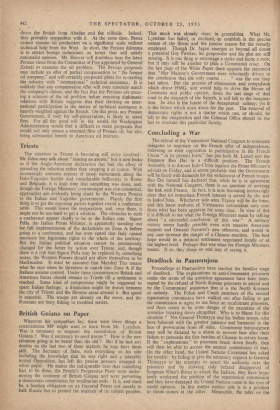Deadlock in Panmunjom
Proceedings at Panmunjom have reached the familiar stage of deadlock. The explanations to anti-Communist prisoners under the' terms of the armistice agreement have been inter- rupted by the refusal of North Korean prisoners to attend and by the Communists' insistence that it is the North Koreans or nobody. The Polish and Czech members of the neutral repatriation commission have walked out after failing to get the commission to agree to use force on recalcitrant prisoners. and there seems to be some danger of the execution of the armistice breaking down altogether. Who is to blame for this situation ? Not General Thimayya and his Indian troops, who have behaved with the greatest patience and humanity in the face of provocation from all sides. Communist intransigence may well be dictated by a desire to recover face after their failure to persuade the first batches of Chinese to return home. If the " explanations " to prisoners break down finally, they will then be able to accuse the neutral commission of bias. On the other hand, the United Nations Command has asked for trouble : by failing to give the necessary support to General Thimayya in his attempts to assert his authority over the prisoners and by showing only belated disapproval of Syngman Rhee's threat to attack the Indians, they have hope- lessly weakened the position of the repatriation commission and they have damaged the United Nations cause in the eyes of world opinion. In this matter neither side is in a position to throw stones at the other. Meanwhile, the talks on the location and composition of the political conference will open at Panmunjom on October 26th, but there are as yet no signs that Britain and America have any agreed policy on the future of Korea. Syngman Rhee has more definite ideas than the Western Foreign Ministers. The lack of a decided policy could leave him free to carry them out.



































 Previous page
Previous page